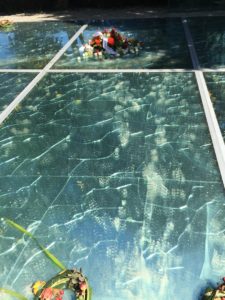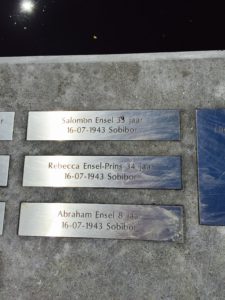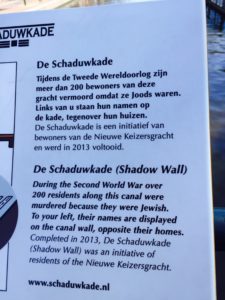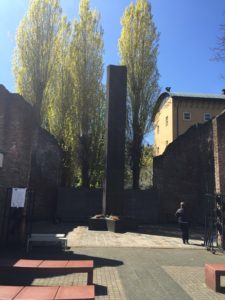For the Auschwitz monument at the Wertheim Park in Amsterdam the Dutch writer and sculptor Jan Wolkers chose to fashion a cracked mirror of six panels reflecting the sky because in his words Auschwitz damaged heaven. The mirror thus refracts a broken sky. In his column “A Time of Bullies” (NY Times April 1, 2016) Roger Cohen observed that in his family the Holocaust was “a horror endlessly refracted.”

The monument was our last stop on a walk arranged by my hosts in Amsterdam through places where Jews had lived and were rounded up to be deported for torture and murder in the years 1940-45. One of the early stops was the so-called “shadow-wall” the side of the New Keizersgracht where the houses face north. There more than 200 residents were rounded up and eventually murdere d. I believe ten of the inhabitants survived. A remarkable feature of this memorial is the listing of names, ages and place of death registered in plaques set into the walkway along the water on the other side of the canal.
d. I believe ten of the inhabitants survived. A remarkable feature of this memorial is the listing of names, ages and place of death registered in plaques set into the walkway along the water on the other side of the canal.
Here is the family Ensel, parents Rebecca and Solomon in their early thirties and their son Abraham 8 years old, killed in Sobibor in 1943. They lived at number 2 across the water. The monument was established in 2013 on the initiative of the current residents on the North Side. Toward the end of our walk we stopped at the Netherlands Theater (Hollandsche Schouwburg) a location for gathering Jews before they were transported to the death camps. No words are adequate to describe the sense of loss and how one bears the “imprint of departed souls,” Cohen again.

I have now traveled to Jerusalem to begin work here tomorrow. Today is Remembrance Day, both here and in Amsterdam. In Israel appropriately called Yom Hashoah. Since words fail me, I resort once again to quotation. Jacob Presser who wrote the story of what happened to the Jews in The Netherlands while it was occupied by Germany saw it as a holy task to remember. On the frontispiece of his book Ruin – the Persecution and Annihilation of Dutch Jewry 1940-1945 (Den Haag: Staatsuitgeverij, 1965) he cited Albrecht Goes who wrote that without forgetting it is not possible to live on but that “now and then there must be those who remember.” (Und es muss ja auch vergessen werden, denn wie könnte leben, der nicht vergessen kann? Aber zuweilen muss einer da sein der gedenkt.” Albrecht Goes: Das Brandopfer, 1953) Helmut Hornbogen in his appreciative but also critical review of Goes observes: “Perhaps remembrance does not open Paradise, but it creates the only space in which life is possible.” (Helmut Hornbogen. Errinnerung an Anfänge: Gespräche mit Albrecht Goes und Hermann Lenz. Tübingen: Narr, 1996. ) So be it then.
